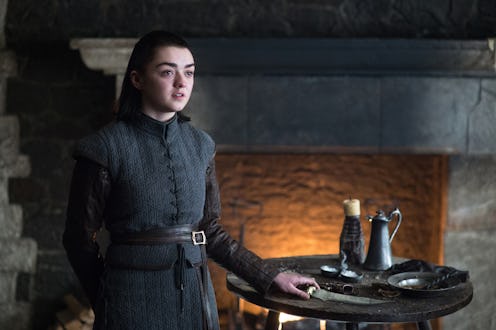Entertainment
Arya Stark May Not Be The Perfect Feminist Hero You Want Her To Be

Game of Thrones has had its fair share of interesting, complex female characters, but it’s never been a particularly good show for women; they tend to get threatened with rape and murder a whole lot and generally don’t tend to have a lot of control over their own lives. This season, however, it seemed like the tide was turning; women were finally getting to rule, and some nice things were actually happening to them for once, like when Arya and Sansa Stark finally reunited. But something is still rotten in Westeros, because even though women are now in charge, femininity is still not a trait that’s celebrated. For proof, look no further than the gendered way Arya demeaned Sansa in Game of Thrones' latest episode, clearly demonstrating that Arya isn’t quite the enlightened feminist figure fans might think.
Thanks to the machinations of Petyr “Littlefinger” Baelish, Arya uncovered a letter that Sansa first wrote to Robb in Season 1, imploring him to swear fealty to King Joffrey after their father was accused of treason. When Arya confronted Sansa about the letter, she did it in a way that reveals she still has a very negative view of femininity, referring to Sansa’s knitting and her “pretty” handwriting with malice in her voice. After Sansa pointed out that the Lannisters forced her to write that letter, Ayra shot back, “Did they? With a knife at your throat? Did they put you on a rack and stretch you until your bones started to pop?”
This small bit of dialogue is especially telling, and speaks to why Arya doesn’t quite understand what kind of danger Sansa was in while living with the Lannisters. While the youngest Stark daughter has faced a lot of violence in her time away from her family, she has never really faced the specific kind of sexual violence that’s often inflicted on female bodies in the show. The only time she has come close to acknowledging that kind of threat was when she briefly disguised herself as a boy to avoid rape and capture in Season 2, and when she donned the face of another young girl to assassinate Ser Meryn Trant in Season 6. Even then, she knew she had the upper hand as a result of her assassin training and wasn’t truly afraid of Trant, not the same way Sansa was when he publicly beat her at Joffrey’s behest.
Because of this, Arya’s gender has never really been much of a burden to her in her post-King’s Landing life; it was only a burden before, when she was chastised for not properly adhering to the “rules” of traditional gender roles despite knowing that they were wrong; as she told her sister, “Septa Mundane used to crack my knuckles because I couldn’t write as well as you.” Clearly, now she still harbors resentment toward the idea of femininity as a construct — and toward Sansa as an apparent representative of said femininity — as a result.
Arya recalled “the pretty dress you were wearing and the fancy way you did your hair” on the day Ned Stark was executed, but says nothing of the way Sansa was physically held in place and forced to watch the decapitation from mere feet away. Arya, remember, had already been grabbed by Yoren of the Night’s Watch and told to look away.
Longtime Sansa defenders know that her situation is the complete reverse of her sister’s. Prior to King Robert’s visit to Winterfell, she thrived in the role that was expected of her, and wanted what women were told to want: pretty things, a loving husband, and a household to maintain. But she lost that naïveté very quickly when she realized that being a woman in Westeros did not afford her any power or agency to stand up for herself against abusive men, like Joffrey and Ramsey Bolton. Arya may have seen more violence, but the violence Sansa encountered is uniquely personal to her, and no more or less psychologically devastating even though it's couched under beautiful dresses — which Bran could stand to learn a thing or two about as well, while we're on the subject.
The show's attitude toward femininity has always mirrored Arya's. As fellow Bustle writer Jordan Lauf pointed out, the show regularly celebrates "badass" women who go against their gender roles (Arya, Brienne, Cersei). But the show then punishes (and often kills) women who show more traditionally feminine traits (Cat Stark, Margaery, Myrcella, Sansa). That's why Arya's views on femininity are important beyond being a frustrating character trait, they're emblematic of a larger issue in Game of Thrones.
Unfortunately, as it stands leading into the finale, Arya and Sansa are still at an impasse, partially because Sansa was understandably hesitant to speak about her experiences with her sister; all she told Arya is that she has “suffered things you could never imagine.” Arya retorted that she can imagine “quite a lot,” but Sansa’s right; no one has any idea what it’s like to be in an abusive situation, let alone several, unless you find yourself in one.
So, until Arya allows herself to understand what Sansa has endured, she won’t truly be able to give Sansa, or any feminine woman, the respect they deserve. And, in this way, Game of Thrones is still failing its characters and female viewers by casting femininity in the role of "weak" once again.